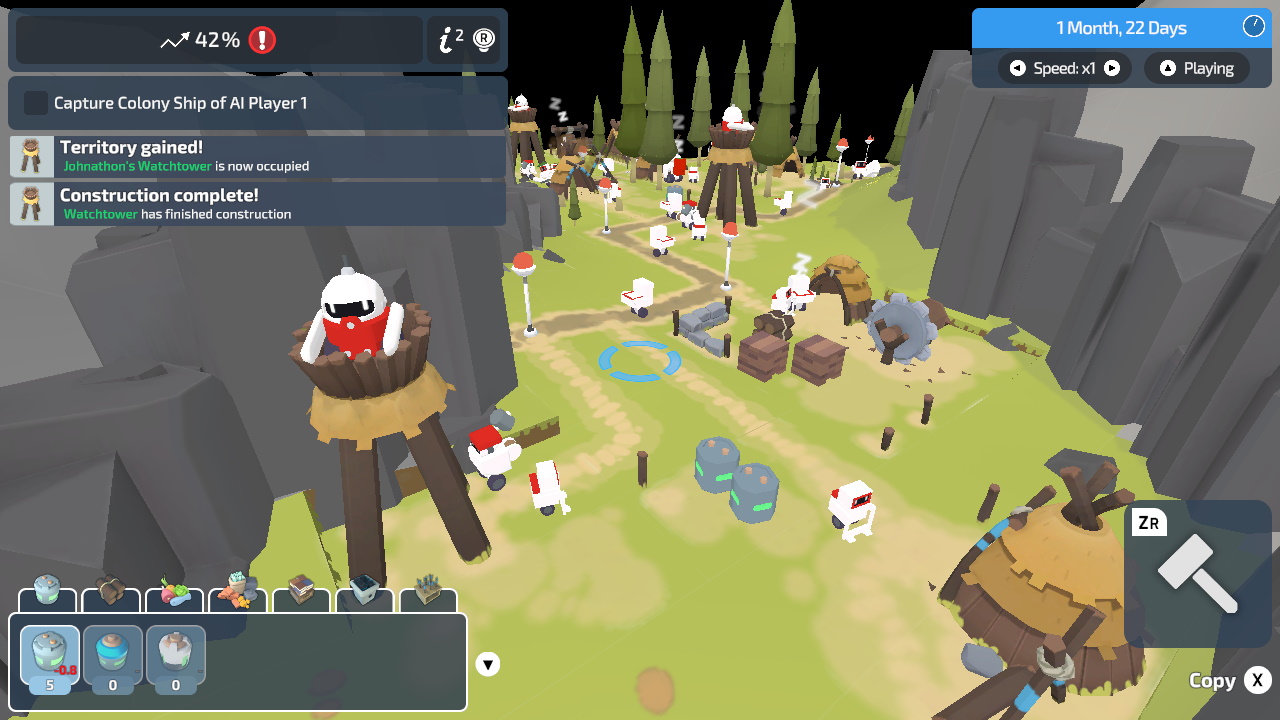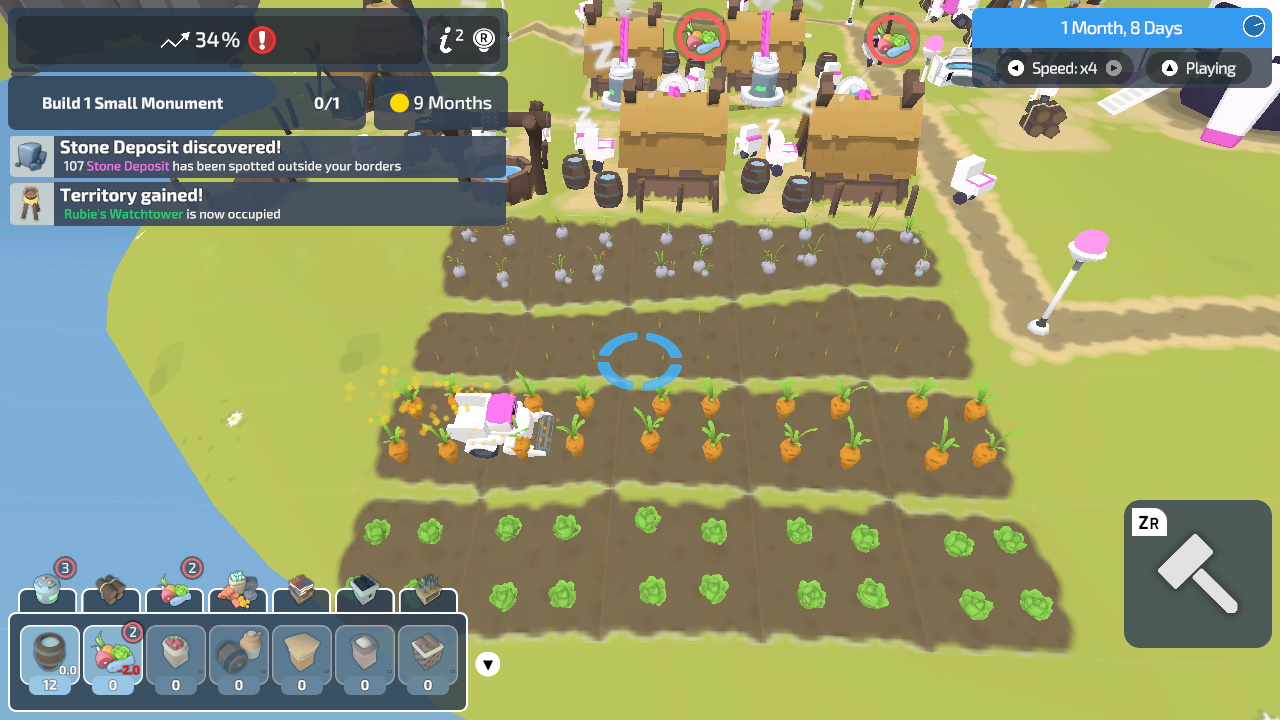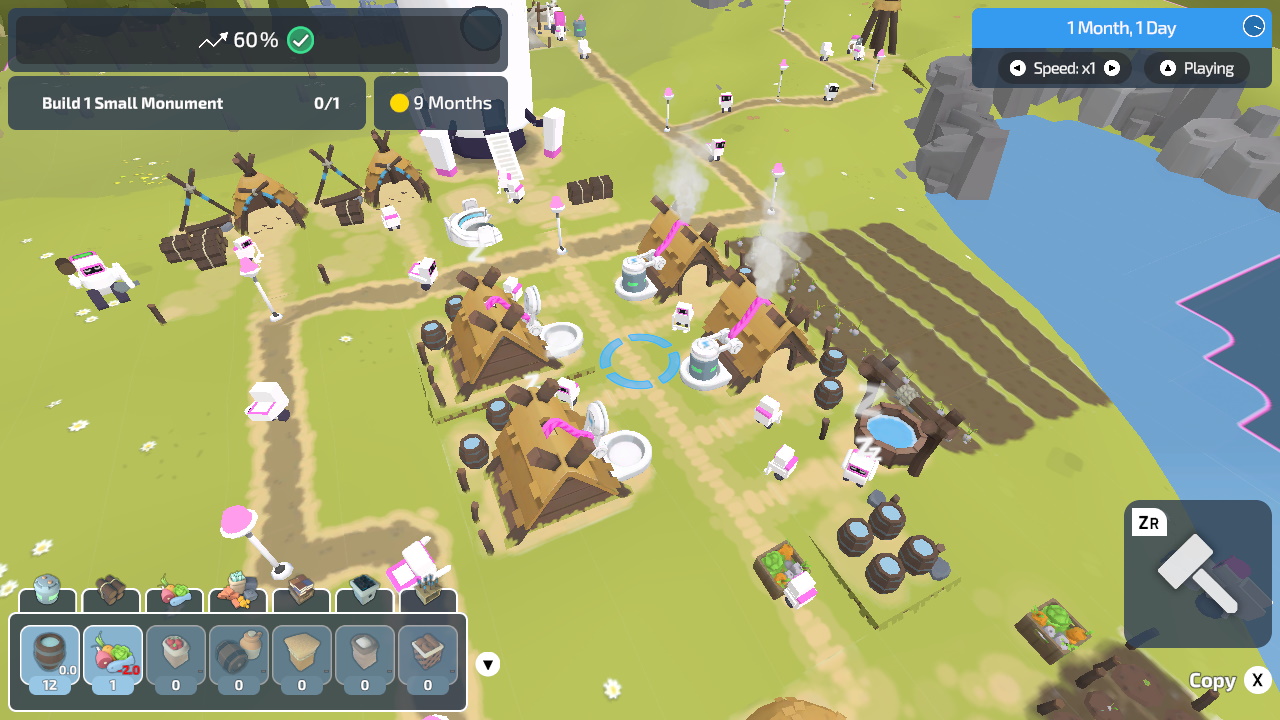The Colonists Review
Summary: The Colonists is a charming sim with plenty of content to satisfy your pioneering dreams
4
I, Robots
The Switch really is the perfect console for management sims, isn’t it? There’s just something really satisfying about getting into bed, pulling up the duvet, lights off, Switch in hand, playing late into the night on a non-taxing resource manager. It’s the kind of comfy gaming that feels great sandwiched between day to day life and that serious, AAA blockbuster you’re devoting the bulk of your spare time to. Perhaps, that’s why the Colonists works so well on Nintendo’s stalwart. It’s as relaxed a journey as you’d like it to be, and rarely does it get stressful enough to pull you from your happy place, despite a few confusing systems along the way.
There’s a warmth about The Colonists, nostalgia inducing gameplay that harks back to the golden age of management sims. It feels like a mini, modern Anno, or the Settlers; there’s even a sprinkling of Age of Empires DNA in the mix. There’s a handful of different modes, but they all encompass a similar objective; land your shuttle, harvest resources and form a colony. Once your robots have unpacked resources from their ship, you quickly establish the necessary buildings to start your colony. A timber yard, a mine and residences are always your starting point, as well as somewhere to produce food and water. Generally, robots can only move across paths and roads, the latter needing to be placed four spaces apart. At each interval, a node is placed and a robot is stationed, allowing your workers to relay resources between points to speed up building. It’s like watching an army of ants mill about their day, and it’s as charming to watch as it is to manage.
Whilst the basics are simple stuff (placing buildings and upgrading tech are all easily managed via idiotproof radial menus), there’s an art to mastering The Colonists that’s not initially obviously. The key to success is to not bottleneck resources; produce too much, and your robots will stop working until space frees up for more stuff. You can build storage yards to store any spare goods, but resources don’t automatically assign, and it’s a little frustrating to try to effectively manage multiple yards, ensuring you aren’t creating a holdup in your pipeline.
It’s a small niggle, but it stems from uneven tutorials, where some systems are well taught, but others, aren’t explained at all. Notably, for example, I struggled with properly managing my harbour. You can send ships out for expeditions to find new land, but, once I’d established a harbour on a far off shore, I couldn’t work out how to carry on ferrying resources between my two territories. At one point, I had three ships sitting idle, full of much needed stone for my second township, but couldn’t get my boats to make the trip across the pixel seas. In the end, I deleted the ships and started again, miraculously forcing them to get the goods to my village and stop their trade embargo on my robot settlers.
I’m certain it was me doing something wrong, rather than a bug or another, pesky issue, but I couldn’t for the life of me work out what I should do differently. The same went for trying to work out the stats pages; there’s ample information available, but I couldn’t really establish what any of it really meant. That being said, the advisor tool is useful, especially if you’re struggling to work out your aim, offering plenty of tips and advice to push your colony forward.
If you want a purely chill experience, you can completely omit combat missions, but personally, I really enjoyed the tug-of-war type battles caused by rival robots trying to take your land. Building watch towers near enemy borders forces your land to expand and vice versa, and there’s some genuine excitement to be had from trying to beat your opponent to fully gaining control.
For the first few hours of my time with The Colonists, I indulged myself in the campaign, which is a surprisingly full-bodied experience, each level taking on average an hour or so to complete. There’s decent variety in missions too, and you can completely disregard any that focus on combat if you wish. Mission objectives include requiring you to build monuments, harvest enough of certain resources – the typical fare you expect from a game like this. It can get a little repetitive; just when you get your colonies going in a campaign mission, you often find that you’re about to complete your goal, and carrying on with the campaign always requires you to start your colonies over again.
It’s why I spent more time with the game’s sandbox mode. I enjoyed messing with the settings, playing at my own pace, and for me, the biggest appeal of The Colonists is the ability to take it easy without the restriction of objectives. I often slowed down the speed of my robot workers to watch them go about their business, and there’s something super satisfying about watching the colony you’ve established become completely self sufficient. As well as a lengthy campaign and a flexible sandbox experience, there’s also a series of challenge levels that vary from time consuming to monumentally challenging, but your enjoyment of these totally depends on how you feel about constantly starting colonies over and over.
Thankfully, it all runs smoothly, chugging along at a more than serviceable framerate both docked and in handheld. Obviously, it’s preferable in the former, making the chunky sprites pop and (more importantly) the text more palatable. For comparison, I also played the game on the PS4, and, to be fair to the Switch, there’s not a hugely noticeable difference between the two. Obviously, the latter packs sharper visuals and doesn’t suffer from squashing some larger menus into a smaller space, but I found myself coming back The Colonists on my Switch, rather than to the slightly superior home console version.
If Earth’s finite resources do begin to dry up in 60 years, then The Colonists feels more like a warning than a management sim. If, however, I’m going to simulate populating a planet for future generations, there’s simply no better way to do it than with The Colonists cute robot pioneers. Chill gameplay, plenty of content and a surprisingly deep management system – it’s an impressive package, it’s just a shame the latter isn’t quite as robust as it should be.










